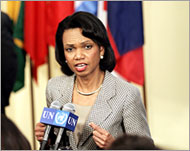Security Council backs Syria resolution
The UN Security Council has voted unanimously for a resolution demanding Syria cooperate fully with a UN investigation into the death of former Lebanese prime minister Rafiq al-Hariri or face possible further action.

The US, France and Britain sponsored the measure in response to a tough report in October by a UN commission that said Syrian security forces and their Lebanese allies organised the bombing that killed al-Hariri and 22 others in Beirut on 14 February.
The report by German prosecutor Detlev Mehlis, who leads the UN inquiry, accused Syria of lack of cooperation and named senior government officials as suspects, including General Assef Shawkat, brother-in-law of Syrian President Bashar al-Assad and head of military intelligence, as well as al-Assad’s brother, Maher Assad.
In an effort to get the resolution adopted 15-0, the Western nations agreed to delete a specific reference to economic sanctions. Instead, the resolution would consider possible unspecified “further action” if Syria did not comply.
Abstentions threat
Russia, China and Algeria had threatened abstentions. Nevertheless, US Secretary of State Condoleezza Rice told the council: “We have affirmed our just demands of the Syrian government – and made it clear that failure to comply with these demands will lead to serious consequences from the international community.”
 |
|
UK Foreign Secretary Straw told |
She said Syria had isolated itself and accused Damascus of false statements, support for terrorism, and interference in the region and “destabilising behaviour in the Middle East”.
Eleven foreign ministers or their deputies among the 15 Security Council members who came to New York for the meeting and negotiated until minutes before the vote.
The resolution, number 1636, demands Syria cooperate unconditionally with the UN inquiry and orders Damascus to take into custody and make available to UN investigators people suspected of involvement in the killing.
It calls for a financial freeze and travel ban on suspects to be named by the Mehlis commission or the Lebanese government.
But this demand was weakened, and any Security Council member can object to a name on such a list.
Syrian denial
Syrian Foreign Minister Faruq al-Shara, accused by Mehlis of giving false statements, denied any involvement of his government in the assassination.
 |
|
Condoleezza Rice accused Syria |
“It is clear for any person who has followed this issue throughout that Syria’s cooperation was complete. I repeat: Complete,” al-Shara told the council.
He said the investigation was conducted in “near-medieval circumstances where the accused is presumed guilty before due process”.
British Foreign Secretary Jack Straw said the Security Council had put Syria on notice that “our patience has limits”, and that the people of Lebanon were owed a “better future”.
Russia’s UN ambassador Sergei Lavrov said the changes in the resolution removed “unnecessary and ungrounded threats”.
Specific action
Asked if the situation was similar to the council’s march towards sanction against Iraq in the 1990s, Lavrov told reporters not to “overdramatise”. But he said “we want this statement to be followed by specific action” from Syria.
|
“It is clear for any person who has followed this issue throughout that Syria’s cooperation was complete. I repeat: complete” |
Algerian Foreign Minister Mohamed Bedjaoui said that as the only Arab council member, “I would like to state here loud and clear that the cowardly assassination … must not under any pretext go unpunished.” But he argued against any
“hasty threat of sanctions”.
French Foreign Minister Philippe Douste-Blazy said the Security Council had “only one aim: the truth, the whole truth” about the assassination.
Brazil had hesitations about sanctions, with its foreign minister, Celso Amorim, saying any additional measures could only be taken by council members on the basis of facts.